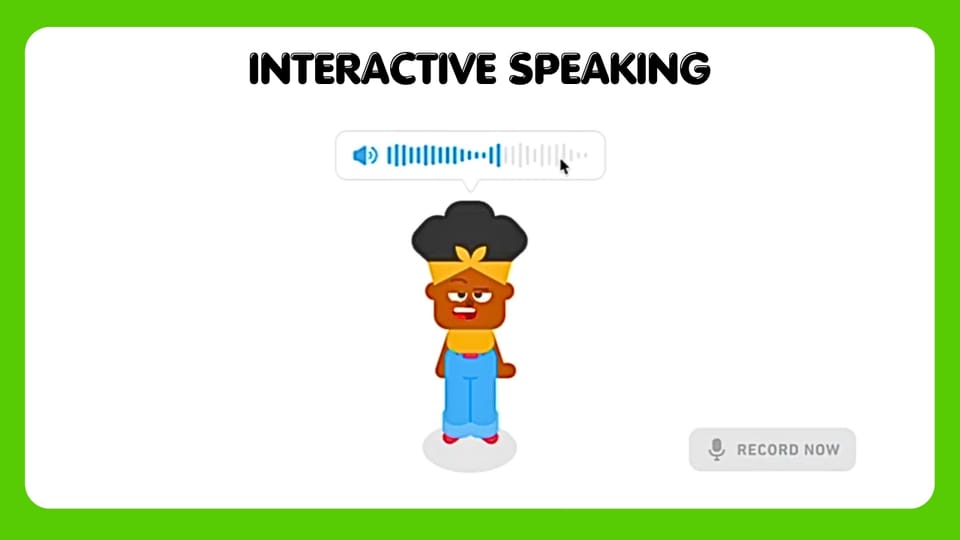Duolingo English Test Preparation: How to Answer the New Interactive Speaking Question

The Duolingo English Test has a new question — and it's a big one.
It’s called Interactive Speaking and it changes how you prepare for the test. In this new task, you’ll have a conversation with a Duolingo character, just like in real life.
Teacher Luke - Interactive Speaking on the Duolingo English Test
If you want to boost your score, your Duolingo English Test preparation must include this new format.
In this article, I’ll show you:
- How this question works
- What to expect
- A simple framework called OREO to help you give great answers
- And sample questions to practice with
Let’s get you DET Ready.
What Is the Interactive Speaking Question on the Duolingo English Test?
This task is different from the usual speaking questions. Here's what you need to know:
- You’ll talk to a Duolingo character
- You’ll answer 6 to 8 questions
- You have 35 seconds to answer each question
- You must click "Record Now" — or your answer won’t be saved
- You can only hear the question once — no repeat button!
This means you need to listen carefully and answer quickly.
Watch me answer Interactive Speaking here on the official DET practice test 👇

Key Tips for Duolingo English Test Speaking Preparation
1. Give Full, Detailed Answers
Short answers = low score. You need to speak for 25–35 seconds and show your English ability.
2. Know the Scoring Criteria
Duolingo scores you on:
- Fluency
- Grammar
- Vocabulary
- Pronunciation
3. Expect Real-World Topics
You’ll get questions on:
- Health
- The environment
- Education
- Technology
- Social issues
✅ Download a free list of possible topics at vip.detready.com.
Use the OREO Template for Better DET Speaking Answers
I created a simple speaking framework called OREO to help you give longer, more structured answers.
O – Opinion
R – Reason
E – Example
O – Outcome (or Conclusion)
Here’s how it works:
🔹 Question: Should schools focus more on creativity than academics?
Opinion:
Yes, I think they should focus more on creativity, not just academics.
Reason:
One reason is that creative thinking helps students solve problems in new ways.
Example:
For example, in my school, we had an art project to reduce waste in our community. It made us think practically and creatively.
Outcome:
As a result, I learned to approach problems differently, which helps me in daily life.
Using the OREO structure helps you stay focused and give longer, more organized answers—without rambling or hesitating too much. You don’t have to follow it every time, and even using just one or two parts can help. But if you struggle to give detailed answers in the Interactive Speaking question, this is a great framework to keep in mind.
Sample DET Interactive Speaking Questions + Answers
Here are real example questions with possible answers.
Q: Are audiobooks good for people who dislike reading?
(Opinion)Yes, audiobooks are an excellent option for people who don’t enjoy reading traditional books. (Reason) They allow people to access the same information in a more flexible and convenient way. (Example)
For instance, someone who finds reading boring or difficult can listen to an audiobook while driving or exercising and still learn something new. (Outcome)
In this way, audiobooks help more people enjoy stories or information, even if they wouldn’t normally pick up a book. It makes learning more accessible for everyone.
Q: Who do you enjoy talking to the most?
(Opinion) I enjoy talking to my brother the most. (Reason) We have very similar interests, which makes our conversations interesting and enjoyable. (Example) For example, we both love sports and science, and we often discuss news or ideas related to those topics. (Outcome) Our talks always make me feel more relaxed and understood, and that’s why I enjoy them so much.
Q: Is listening as important as speaking?
(Opinion) Yes, listening is just as important as speaking in a conversation. (Reason) When you listen well, you show respect and better understand the other person’s point of view. (Example) For instance, if I really listen to a friend, I can respond more thoughtfully and avoid misunderstandings. (Outcome) This helps build trust and creates a deeper and more meaningful conversation overall.
Q: What’s hard about speaking in a second language?
(Opinion) One of the hardest parts of speaking a second language is understanding cultural context. (Reason) Even if someone is fluent, they might still struggle with jokes, slang, or local references. (Example) For example, my wife speaks English very well, but she sometimes finds it difficult to follow British humor or small talk. (Outcome) This makes conversations harder, not because of language skills, but because of missing background knowledge.
Q: Are audiobooks good for people who dislike reading?
(Opinion) Yes, audiobooks are an excellent option for people who don’t enjoy reading traditional books. (Reason) They allow people to access the same information in a more flexible and convenient way. (Example) For instance, someone who finds reading boring or difficult can listen to an audiobook while driving or exercising and still learn something new. (Outcome) In this way, audiobooks help more people enjoy stories or information, even if they wouldn’t normally pick up a book. It makes learning more accessible for everyone.
Join DET Ready for Full Duolingo English Test Preparation
Want more help?
When you join DET Ready VIP, you get:
✅ Live lessons with me
✅ Full speaking and writing courses
✅ My AI-powered practice platform
✅ Unlimited Feedback from me
✅ Bonus resources and templates like OREO and PPF
Join here and I'll see you in my live lessons soon 👉 vip.detreay.com
Thanks,
Teacher Luke:
